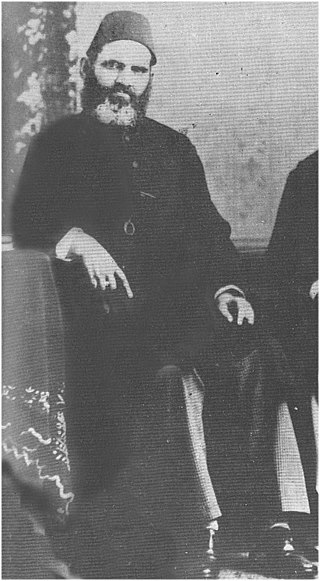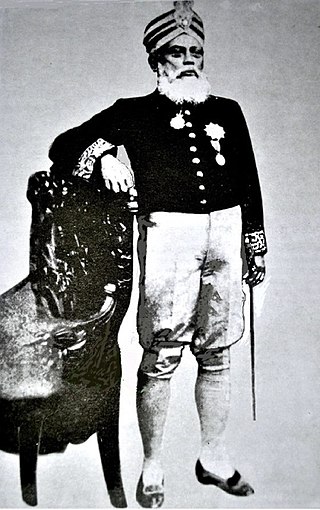Related Research Articles

Sir Syed Ahmad Khan, also spelled Sayyid Ahmad Khan, was an Indian Muslim reformer, philosopher, and educationist in nineteenth-century British India.
The three Round Table Conferences of 1930–1932 were a series of peace conferences organized by the British Government and Indian political personalities to discuss constitutional reforms in India. These started in November 1930 and ended in December 1932. They were conducted as per the recommendation of Muhammad Ali Jinnah to Viceroy Lord Irwin and Prime Minister Ramsay MacDonald, and by the report submitted by the Simon Commission in May 1930. Demands for Swaraj or self-rule in India had been growing increasingly strong. B. R. Ambedkar, Jinnah, Sir Tej Bahadur Sapru, V. S. Srinivasa Sastri, Sir Muhammad Zafrulla Khan, K. T. Paul and Mirabehn were key participants from India. By the 1930s, many British politicians believed that India needed to move towards dominion status. However, there were significant disagreements between the Indian and the British political parties that the Conferences would not resolve. The key topic was about constitution and India which was mainly discussed in that conference. There were three Round Table Conferences from 1930 to 1932.

Tamil Muslims are Tamils who practise Islam. The community is 6 million in India, primarily in the state of Tamil Nadu where 90% of the Muslim community identified themselves as Tamils. In Tamil Nadu, the majority of Tamil-speaking Muslims belong to the Rowthers Community while other Muslims live in coastal Tamil Nadu. However, the majority of these individuals are native Tamils who converted influenced by Tajuddin Cheraman Perumal. There is a substantial diaspora, particularly in Southeast Asia, which has seen their presence as early as the 13th century. In the late 20th century, the diaspora expanded to Western Europe, Persian Gulf and North America. These Tamil speaking Muslim communities in Sri Lanka were known as the Sonakar, which is derived from the term Yona, originally meaning a Moors.

Nawab Mohsin-ul-Mulk, Munir Nawaz Jang, also known as Syed Mehdi Ali, was an Indian Muslim politician. He was a close friend of Syed Ahmed Khan, was involved in the Aligarh Movement and was one of the founders of the All India Muslim League in 1906.

SirZiauddin Ahmad was an Indian mathematician, parliamentarian, logician, natural philosopher, politician, political theorist, educationist and a scholar. He was a member of the Aligarh Movement and was a professor, principal of MAO College, first pro vice-chancellor, vice chancellor and rector of Aligarh Muslim University, India.
The All India Muhammadan Educational Conference was an organisation promoting modern, liberal education for the Muslim community in India. It was founded by Sir Syed Ahmed Khan, also the founder of the Aligarh Muslim University. All India Mumammadan Educational Conference was the origin of the All-India Muslim League. The Muslim League was born in the 20th session of All India Muhammadan Educational Conference, which was established by Syed Ahmed Khan in Aligarh in 1886. Muhammadan Educational Conference used to hold its annual meetings in various cities where, by the co-operation of local Muslims, steps were taken for the progress of education.

Nawab Sir Khwaja Salimullah Bahadur was the fourth Nawab of Dhaka and one of the leading Muslim politicians during the British rule in India.

The New College is an institution of higher education in Chennai, Tamil Nadu. Established in 1951, the institution is one of the affiliated colleges of the University of Madras, with autonomous status. The college was established by the Muslim Educational Association of Southern India (MEASI) to meet the educational requirements of the Muslim students in Southern India. The majority of students in the college are from Muslim community.
Rahil Begum Sherwani was the founder of the All India Women's Muslim League. The AIWML was the women's wing of the All India Muslim League. It was inaugurated by Muhammad Ali Jinnah in Aligarh in 1938. She was the younger sister of the famous Indian scholar Haroon Khan Sherwani and the daughter of Haji Musa Khan Sherwani.
Chennai is home to many educational and research institutions. IIT Madras, located in South Chennai is considered as the premier centre of engineering education in India. Anna University and the University of Madras are the oldest state owned universities which are ranked among the best universities in India. The College of Engineering, Guindy and Madras Institute of Technology, which are the constituent college of Anna University along with Alagappa College of Technology are the pioneer institutes of engineering education in India. Some of the oldest medical colleges India, the Madras Medical College (1835) and Stanley Medical College (1938) are located in the city. Notable, liberal arts colleges in the city include Loyola College, Madras Christian College, Presidency College, Stella Maris College, Women's Christian College and Ethiraj College for Women.

Jamal Mohamed College is a Government-aided and self-financed institution founded in 1951 by M. Jamal Mohamed Sahib and N.M. Khajamian Rowther. The college campus is located in Tiruchirappalli, India and is affiliated to Bharathidasan University. The Day session is for male students and Evening session is for female students.

M. Muhammad Ismail Sahib was an Indian politician and social worker from southern Indian state Tamil Nadu. he was a founder of the Indian Union Muslim League party after the partition of British India. He was popularly known in Tamil Nadu and Kerala as the "Quaid-e-Millat" .. Ismail was a member of Madras Legislative Assembly and Leader of the Opposition (1946—52). He was also a member (1948—50) of the Constituent Assembly, the drafting body of the constitution of India. He was also a member of Rajya Sabha (1952—58) and Lok Sabha.
Syed Nabiullah was a prominent barrister from Lucknow, India, and one of the eminent leaders of the All India Muslim League.

Aligarh Muslim University is a public central university in Aligarh, Uttar Pradesh, India, which was originally established by Sir Syed Ahmad Khan as the Muhammadan Anglo-Oriental College in 1875. Muhammadan Anglo-Oriental College became Aligarh Muslim University in 1921, following the Aligarh Muslim University Act. It has three off-campus centres in AMU Malappuram Campus (Kerala), AMU Murshidabad Centre, and Kishanganj Centre (Bihar).
Arcot Ramachandran (1923-2018) was an Indian scientist, anthropologist, author and a former Under-Secretary General of United Nations Centre for Human Settlements, known for his scholarship on the subjects of heat and mass transfer and environment and his social commitment to the cause of sustainable development. The Government of India honoured him in 2003, with the Padma Bhushan, the third highest civilian award, for his services to the fields of Science and Engineering.

Munirathna Anandakrishnan was an Indian civil engineer, educationist, a chairman of the Indian Institute of Technology, Kanpur and a vice-chancellor of Anna University. He was also an Advisor to the Government of Tamil Nadu on Information Technology and e-Governance. A winner of the National Order of Scientific Merit (Brazil), he was honored by the Government of India, in 2002, with Padma Shri, the fourth highest Indian civilian award.
The Aligarh Movement was the push to establish a modern system of Western-style scientific education for the Muslim population of British India, during the later decades of the 19th century. The movement's name derives from the fact that its core and origins lay in the city of Aligarh in Central India and, in particular, with the foundation of the Muhammadan Anglo-Oriental College in 1875. The founder of the oriental college, and the other educational institutions that developed from it, was Sir Syed Ahmed Khan. He became the leading light of the wider Aligarh Movement.

Sir Syed Shamsul Huda (1862–1922) was a Muslim political leader of the Bengal Executive Council. He became the first British Indian Muslim President of the Legislative council in 1921. Huda was born in Gokarna, palace known as Gokarna Nawab Bari Complex Nasirnager, Brahmanbaria. It was the part of Comilla. Earlier known as greater Hill Tipperah. His father Syed Riazat Ullah was the editor of The Doorbeen, a Persian weekly journal.
Shia College is a college located in old Lucknow, Uttar Pradesh, India. It is affiliated with the University of Lucknow and one of the institutes of higher education in India.
References
- ↑ "The New College - MEASI". Archived from the original on 28 September 2007. Retrieved 27 April 2007.
- ↑ "MIIT - About Us". Measiit.com. Archived from the original on 26 February 2012. Retrieved 23 February 2012.
- ↑ Prashant More, J. B. (1997). MEASI comes under the control of Tamil Muslims within a generation. ISBN 9788125011927 . Retrieved 9 October 2012.